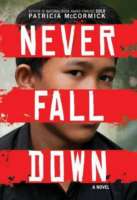
Never Fall Down
Written by Patricia McCormick
Balzer & Bray, 2012, 224 pp.
ISBN: 978-0061730931
When soldiers from the Khmer Rouge arrive in Battambang, Cambodia in 1975, Arn is an eleven-year-old boy who dances, sings and sells ice cream to earn a little change. But life soon changes for Arn and his people who are herded into the countryside, separated from family and forced into labor camps, dying en masse from starvation, exhaustion, malaria, torture, and execution. Arn learns to become numb and invisible to avoid the attention of the brutal Khmer Rouge. “I see some kids die in the field…They fall down, they never get up. Over and over I tell myself one thing: never fall down” (p.42).
After weeks of grueling work in the rice paddies, soldiers ask if any of the children can play an instrument. Never having played a note, Arn volunteers. Urgently mastering the khim, a traditional dulcimer-like instrument, Arn smiles, sings and plays the propaganda songs that the soldiers demand, knowing that his life depends on it. He also artfully steals food to keep other children alive. But when the Vietnamese invade to liberate Cambodia, the Khmer Rouge force Arn to take up the instruments of war and become a soldier. This haunting novel transports readers from Arn’s music-filled hometown to the heart of the tragedy where a quarter of Cambodia’s population perished in what would become known as The Killing Fields. The page-turning drama moves to overfilled refugee camps in Thailand and finally to America where Arn becomes involved in human rights activism.
Patricia McCormick, a former journalist, relinquished a “Walter Cronkite voice” and instead emulated Arn Chorn-Pond’s “distinct and beautiful” patois (p. 216). In doing so, she found she could step back and let Arn convey his experiences more authentically. “When he talks about his childhood it’s as if he becomes that little boy all over again. He speaks with an urgency, a pure terror at times, that is palpable” (p.216). The raw, spare prose feels immediate, troubling and convincing. But perhaps what is unsaid is even more chilling. “The kids who don’t work hard, sometime they get sent to another place they call lazy village. And we don’t see them again….One time I hear a kid ask where is his sister. The Khmer Rouge laugh and say she still working in the field, ‘only now she’s fertilizer’” (p.41).
McCormick, known for her serious research and empathetic treatment of young people in crisis, explains in an Author’s Note how she worked together with Arn to capture his horrific and heroic story. In addition to multiple interviews with Arn, McCormick also spoke with his adoptive family in the United States as well as fellow survivors in remote parts of Cambodia to retrace, authenticate and complete the picture of Arn’s early life. The story behind the writing of Never Fall Down, a discussion guide for readers, and a compelling video discussion between the author and Arn is available at Harper Teen.
Arn not only survived, he went on to devote his life to humanitarian causes, founding several NGOs including Cambodian Living Arts whose mission is to transform Cambodia through the performing and visual arts. Arn is a representative for Amnesty International and has received multiple human rights awards. He now lives in Cambodia, spending part of the year speaking in the United States.
To further explore the author’s craft, educators could introduce readers to Purple Heart (Patricia McCormick, 2011) where the moral predicaments and human costs of war are closely examined. To extend understanding about The Killing Fields and to further reflect upon the importance art and culture, particularly music, as an antidote to and refuge from violence, go to Jocelyn Glatzer’s 2003 documentary, The Flute Player, and the Michelle Lord’s 2008 picturebook, A Song for Cambodia, which are both about Arn Chorn-Pond’s experiences. Never Fall Down could be compared and contrasted with First They Killed My Father: A Girl of Cambodia Remembers (Loung Ung, 2001), where the war is shown through the eyes of a young girl, the daughter of a high-ranking official in Phnom Penh. With its themes of child soldiers, family separation, genocide, borders, immigration, the redeeming power of music, and human rights activism, a natural pairing for this novel would be A Long Way Gone: Memoirs of a Boy Soldier (Ishmael Beah, 2007), set in Sierra Leone.
Never Fall Down is a visceral and poignant portrait of war intended for readers aged 14 and older. Arn Chorn-Pond’s story is harrowing yet his passion and activism for human rights inspire great hope. As Archbishop Desmond Tutu comments in a book-jacket blurb, this novel can “teach us all about finding the courage to speak our truth and change the world.”
Chloë Hughes, Western Oregon University, Monmouth, OR
WOW Review, Volume V, Issue 1 by Worlds of Words is licensed under a Creative Commons Attribution-NonCommercial-ShareAlike 4.0 International License. Based on work at https://wowlit.org/on-line-publications/review/v-1/

Thank you, Judi Moreillon, for this wonderful and thorough review.
I appreciate the connection to other books about the effects of war on children and hope, as more titles with international settings are published, young US readers’ perspective and understanding of world events continues to deepen.
Interested teachers can find a discussion guide for MY BROTHER’S SHADOW on the publisher’s website that includes a bibliography of WWI titles. http://media.us.macmillan.com/discussionguides/9780374351229DG.pdf
For teachers, students and ‘history nerds’ with an interest in primary sources I would like to recommend the website of the German History Institute in Washington, D.C.. Their digital library links to documents, images, etc., sorted by time periods, with translations and captions in English. http://germanhistorydocs.ghi-dc.org/